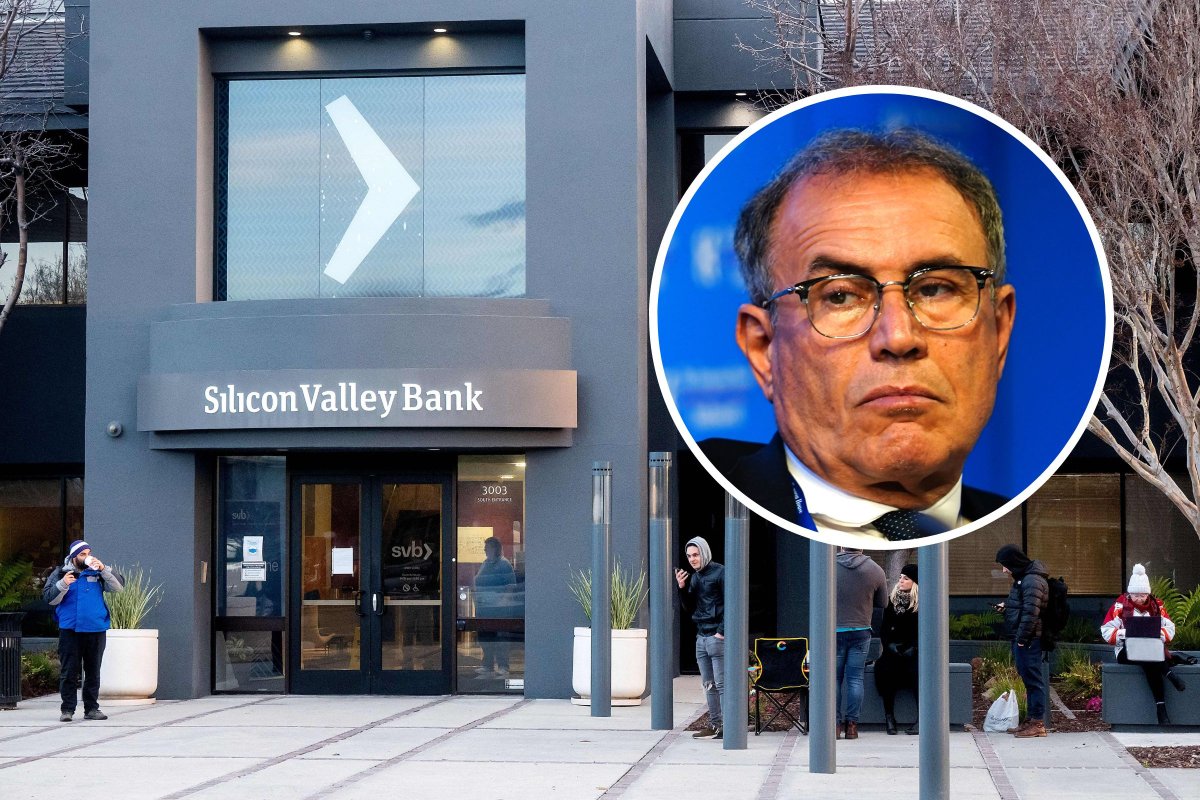- The collapse of Silicon Valley Bank poses a risk of "global contagion," economist Nouriel Roubini told Newsweek.
- European bank stocks closed at their lowest levels since their assets were impacted by the war in Ukraine.
- On Monday, U.S. President Joe Biden has promised that no losses will be borne by taxpayers, but Roubini warned there would still be a "moral hazard" in bailing out depositors.
"Dr. Doom" economist Nouriel Roubini is warning that the recent collapse of Silicon Valley Bank (SVB) poses a risk of "global contagion."
"There is at least one financial institution in Europe that has been historically undercapitalized, have had problems of recapitalizing, might have some bad assets, some exposures to long-term securities and unrealized losses," Roubini, who earned his nickname for predicting the 2008 financial crisis, told Newsweek on Monday.
"If something were to happen with this institution...that will be much more systemically important—we're speaking about institutions with trillions of dollars of assets, not $400 billion like SVB," he said.
The recent chaos surrounding SVB's closure has not been limited to the U.S., like Roubini noted. On Monday, European markets closed much lower with bank stocks falling 5.65 percent—the biggest slide in more than a year. The most recent worst day had been on March 4, 2022, shortly after Russia invaded Ukraine, when bank stocks fell 6.66 percent.

Monday's troubling numbers come after SVB suffered the second-largest bank failure in American history last week. On Friday, federal regulators took over the Santa Clara, California-based institution after a series of massive withdrawals over the course of 48 hours created a bank run.
As part of the fallout, another financial institution in New York, Signature Bank, was shut down two days later by authorities who feared keeping the bank open could threaten the stability of the financial system.
On Monday, Europe's Stoxx 600 index closed down 2.34 percent, Germany's DAX was down 3 percent, France's CAC 40 fell 2.9 percent and the UK's FTSE 100 declined 2.6 percent. Shares of Switzerland's Credit Suisse hit a record low, tumbling more than 12 percent.
"That's the natural lag of the global contagion," said Roubini, a former senior adviser to Treasury Department Undersecretary for International Affairs Timothy Geithner during the Obama administration. "That's why even in Europe, stocks are way down, even though they had nothing to do with this particular [collapse]."
While Friday's news could snowball into something greater, Roubini stressed that it is mainly a small group of small to midsize banks that are at risk, not the entire banking system and bigger-name banks like Bank of America or JP Morgan Chase that could go under.
He said the banks that are facing a possible collapse are regional banks that lack a large depositor base, have a lot of securities that have lost value and whose capital would be wiped out should those securities be sold at market price.
"The run may continue," he said. "The crisis is not over."
In the wake of SVB's implosion, the Treasury Department and Federal Reserve has rushed in to take a series of steps that would reinstill confidence in the American banking system.
Speaking from the White House on Monday, President Joe Biden promised SVB and Signature Bank customers that they would have access to their money and that stronger banking regulations would follow.
However, Roubini said, "in a sense, [the feds] have already done too much" because they've "fully backstopped and bailed out the depositors."
While Biden has insisted that "no losses will be borne by the taxpayers," Roubini noted that the creation of a new Bank Term Funding Program, which the Fed has opened to help keep money flowing through the system, will be financed by taxpayer dollars.
"To say, 'I'm not going to tax the taxpayer, we're going to tax the banks to raise money to fund it'—it is a tax and it is a bailout," he said.
"Yes, there's a panic and you want to stop the panic, but the lesson is that many banks took reckless risks," he said. "So, you have to worry about the moral hazard. If you keep on bailing out everybody, people are going to take the risk because you are, like in the past, privatizing the gains and socializing the losses."
Uncommon Knowledge
Newsweek is committed to challenging conventional wisdom and finding connections in the search for common ground.
Newsweek is committed to challenging conventional wisdom and finding connections in the search for common ground.
About the writer
Katherine Fung is a Newsweek reporter based in New York City. Her focus is reporting on U.S. and world politics. ... Read more
To read how Newsweek uses AI as a newsroom tool, Click here.






